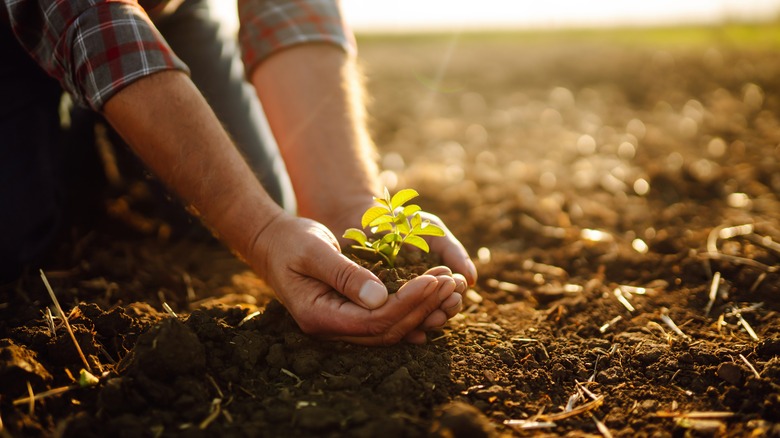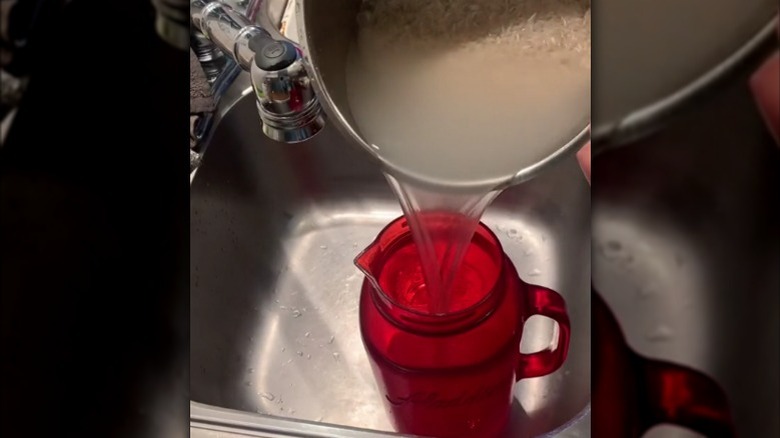The Interesting Way Rice Can Serve As Fertilizer In Your Garden
If you are an avid gardener and consider your thumbs the greenest in the neighborhood, then you probably already know how important of a role the health of soil plays in maintaining a healthy green space. However, ensuring that your soil stays rich in helpful nutrients doesn't require you to have a Ph.D. in Chemistry, instead, you can use ingredients commonly found around the kitchen to give your soil the boost it needs. Although some folks purchase soil fertilizer there are some ways you can utilize your food waste instead. Using leftover rice water for example can actually be a super — but not often considered — benefit to your home garden.
For those who use a lot of rice in their home cooking, make sure you don't waste that cloudy rice water when you are done washing it. Washing your rice before you cook can clear the granules of dirt and debris but it also rinses off the dust it has collected when the rice bumps and grinds together. This by-product is rich in nitrogen, potassium, and phosphorus which is a nutritional shot in the arm for your garden. Here's how you can utilize your leftover rice water to fertilize your garden.
How to collect rice water so it's ready for your garden
To start collecting your own rice water at home you can save the water normally used to wash and clean your rice of choice, as shown in a TikTok video shared by @rooftop2table. In a clean bowl, add around 2 to 3 cups of water to the amount of rice you are using for your meal. Agitate the rice with your clean hands or a spoon so that the dust and any other debris are removed. Let the rice soak for 30 to 45 minutes. When ready, give the rice another quick stir then strain the rice and pour the cloudy rice water into a separate bowl or container. Afterward, that nutrient-filled rice water can be placed in a watering can so that it can be easily distributed to the soil in your garden.
For those who don't rinse their grains, you can still get that helpful liquid after the rice has been boiled. Allow your rice and water mixture to boil. When it's cooked strain your rice and save the leftover water. If the water is a little too thick then you can thin it by adding some extra water and stirring it together. Because using hot water on the soil of your plants is not recommended, make sure to allow the rice water to cool down before distributing it.
Why is rice water a good fertilizer for your garden
Rice water has a good balance of low-level nutrients such as nitrogen — which aids in the chlorophyll process keeping the leaves nice and green, phosphorus — good for root and seed health, and potassium — which takes care of the entire plant's health and aids to ward off disease, not to mention other helpful benefits. Rice also leaves behind starch in the water when it is rinsed or boiled. These carbohydrates can be absorbed by your plants and stored to add energy as well as encourage the growth of bacteria such as lactobacilli and mycorrhizae. The bacteria help the root system of the plants to reach the minerals and nutrients that may be more difficult to get.
Rice water is also very affordable as it is the by-product of simply rinsing or cooking your rice, and can be substituted in any type of irrigation method you use. It is also more eco-friendly as you are not introducing a chemical-based fertilizer to your garden and instead are sticking to more natural ingredients. However, just like other fertilizers, it should be used in moderation so as not to shock the soil system of your plant life. Generally, rice water should not be used more than once a month in your garden's soil.

